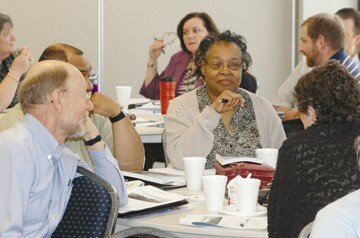
Deepening your effectiveness
“People want to be noticed,” said author Dan Glover. This is a key to connecting people into relationship with the church.
Glover described this ability to notice people, not as giving them a name tag or making them stand up in church, but in those fifteen seconds that we personally acknowledge their significance.
 More than 60 people gathered at the Conference Center May 9th to hear a presentation called “Deepening Your Effectiveness: Restructuring the Local Church for Life Transformation.”
More than 60 people gathered at the Conference Center May 9th to hear a presentation called “Deepening Your Effectiveness: Restructuring the Local Church for Life Transformation.”
Participants discovered how to move from a church focused on the activity calendar to a place where people fit into the body of Christ.
Answering the big question, “How do we help people move from being far from God to a fully devoted relationship with Christ?” presenters Dan Glover and Claudia Lavy gave easy-to-understand answers about how to intentionally help people develop in their faith.
Glover is the Discipleship Director at Evangelical United Methodist Church in Greenville, Ohio. Claudia Lavy served as a lay person on the Discipleship Ministry Team at Ginghamsburg UMC.
Dan Glover, used going to the beach as a metaphor, to help the participants understand the stages of a person’s faith development.
People start out “on the beach” where they simply come and see what is going on, he said. The next stage is “on the shoreline” where people check out the water. The third stage is “in the waves” where a person makes a commitment. In the fourth stage the person is in the water and their “feet have come off the bottom.” Finally, stage six is when they “move into the deep.”
Is the church a place where authentic relationships can happen? This question is an important one for each local church to be asking. Often the question many church leaders ask is “How can we get more people active in what is happening on the church calendar?”
According to Glover, authentic relationships are more critical to people moving deeper in their relationship with God.
Glover identified that each stage of a person’s faith development has a primary question they are asking and a primary relationship they need to help them grow in faith. There is also a primary barrier that needs to be overcome to help them experience transformation. For example, a person who is a new follower of Christ is asking the question, “How do I fit in?” they want to know where they belong in the local church or how they are to get connected.
The church tends to move them towards an activity like serving on the trustees rather than moving them deeper into relationship with God and others. The primary relationship they need is a small group leader or teacher to help them identify how to grow and serve.
The biggest barrier to their growth is getting comfortable with just coming to church on Sunday.
Lavy spent the afternoon leading ministry groups of clergy and laity in a discussion about developing an intentional discipleship pathway in the local church that is relevant to their context. She identified the need to provide opportunities for “intentional transformative encounters with God.”
Local church leaders made honest evaluations of their church’s invitational discipleship opportunities like worship and hospitality. They also looked at instructional opportunities like an orientation to the church’s mission amd vision, discipleship pathway, and next step in faith.
Many of the church leaders acknowledged that many of their churches did not have a clear discipleship pathway.
Church leaders also evaluated their relational discipleship opportunities, like small groups. People need places where they are safe to be themselves and experience God’s grace. When they have those opportunities they are more open to moving into deeper water, a deeper relationship with God, where they can hear God’s call upon their lives.
According to Proverbs 20:5, “The purposes of a person’s heart are like deep waters, but someone of understanding draws them out.”
The final stage of the pathway is creating opportunities for servant discipleship to occur through one-on-one relationships. The hope is to have a local church filled with “spiritually developed servants.”
The presenters asserted that it is not the church’s role to identify the specific call upon a person’s life. The church is called to equip people to be spiritual servants and the result will be that God will make it clear to them what they are to do.

Login/Register to leave comment